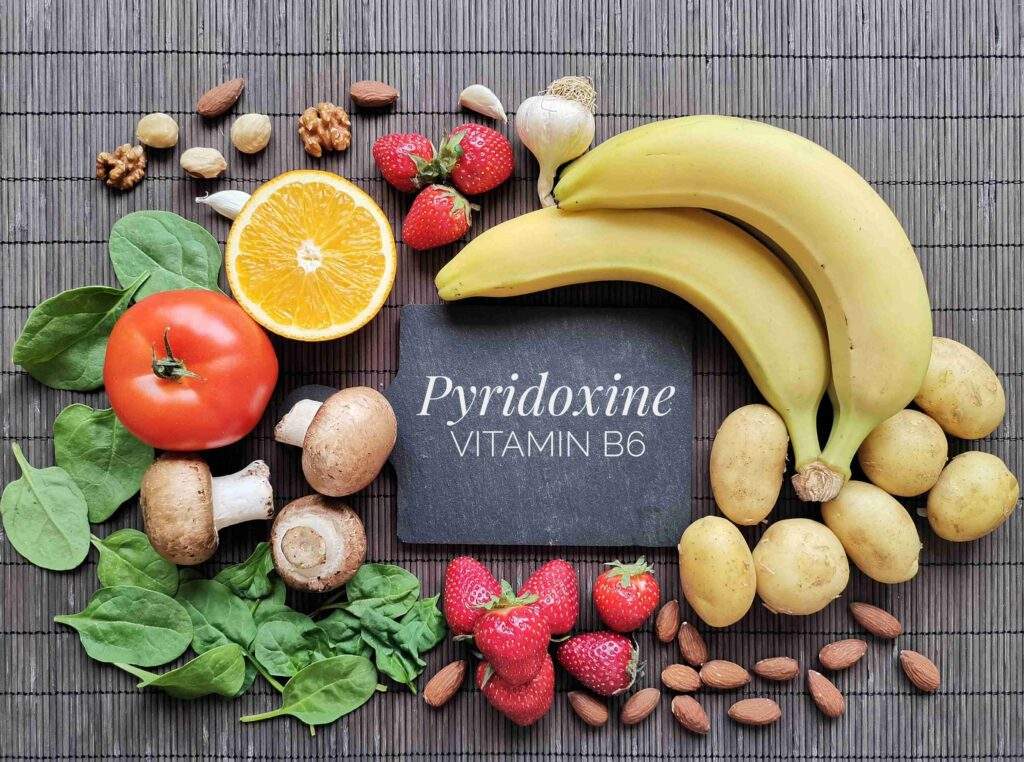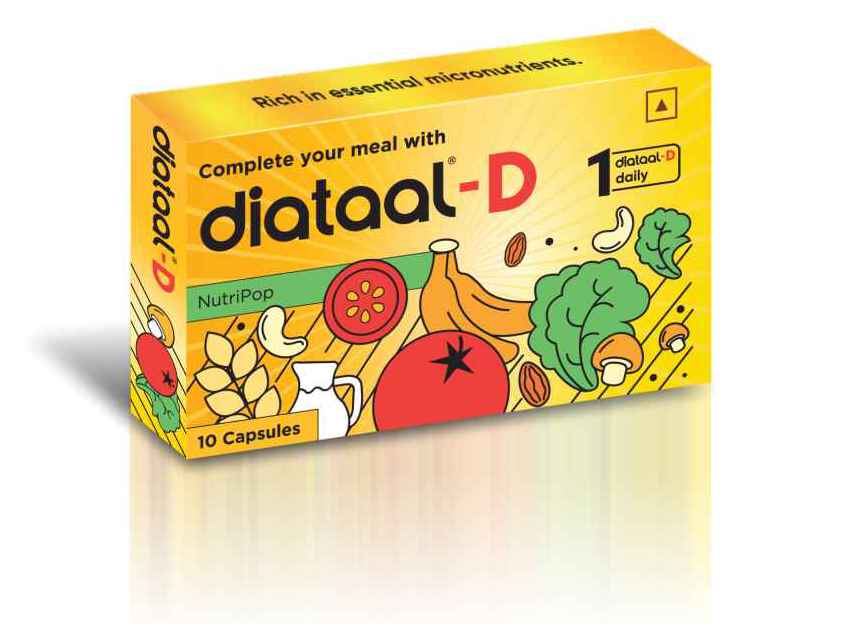
Vitamin B6 Deficiency: Understand the Symptoms, Causes and Supplements
Ever thought about the significance of Vitamin B6 for your body? While many people underestimate the importance of this vitamin, they don’t know about the adverse effects its deficiency can cause. Vitamin B6 deficiency is most common in people suffering from liver, kidney and digestive diseases. In this blog post, we will read about this not-so-normal vitamin in detail.
Index
| ● Introduction |
| ● What is Vitamin B6? |
| ● The Importance of Vitamin B6 |
| ● Vitamin B6 Deficiency Symptoms and Signs in the Body |
| ● Vitamin B6 Deficiency Causes |
| ● Diagnosing Vitamin B6 Deficiency |
| ● Treating Vitamin B6 Deficiency |
| ● Preventing Vitamin B6 Deficiency |
| ● Potential Risks and Side Effects |
| ● Conclusion |
| ● Product Mentioned in this blog |
| ● FAQs |
What is Vitamin B6?
Vitamin B6 is one of eight B-group vitamins that is important for cell function. It improves metabolism, creates blood cells and keeps cells healthy. Being water-soluble, it can’t stay in the body for long periods, and hence, it needs to be replenished regularly through diets and supplements. Its common forms include pyridoxine, pyridoxal, and pyridoxamine. Good dietary sources of vitamin B6 include poultry, fish, organ meats (such as liver), potatoes, bananas, nuts, and whole grains.

A healthy diet can restore your Vitamin B6 levels
The Importance of Vitamin B6
Vitamin B6 is an essential nutrient that plays a crucial role in numerous physiological processes in the body. Some of the benefits include:
● Energy Metabolism
Vitamin B6 is involved in the metabolism of carbohydrates, proteins, and fats. It helps to convert the food we eat into energy that our body can use.
● Red Blood Cell Production
Being involved in the production of hemoglobin, Vitamin B6 aids in the formation and maturation of red blood cells, thus supporting healthy blood circulation.
● Supports Immune System Function
By promoting the development and function of immune cells, intake of Vitamin B6supports the maintenance of a healthy immune system.
● Skin Health
Vitamin B6 plays a role in maintaining healthy skin. It contributes to the production of collagen, a protein that supports skin structure and helps with wound healing.
Vitamin B6 Deficiency Symptoms and Signs in the Body
The various Vitamin B6 deficiency symptoms include –
● Since Vitamin B6 helps in the synthesis of collagen, its deficiency can lead to skin rashes on your scalp, face, neck and upper chest.
● Fewer amounts of Vitamin B6 in your body leads to sore, red and swollen lips with cracked mouth corners.
● Your tongue may become swollen, painful, smooth, inflamed, or reddish if you don’t get enough B6. This is called glossitis.
● Vitamin B6 deficiency can reduce the generation of antibodies necessary to fight infections, thereby weakening a well-working immune system.
● You tend to feel unusually tired and sluggish if you don’t have enough Vitamin B6 foodsin your diet.
Vitamin B6 Deficiency Causes
There are several Vitamin B6 deficiency causes which are listed as follows:
● Inadequate Vitamin B6 foods intake
● Malabsorption issues include celiac disease, Crohn’s disease, ulcerative colitis and other digestive disorders that affect nutrient absorption.
● Alcoholism
● Genetic factors
● Ageing
Diagnosing Vitamin B6 Deficiency
To diagnose a vitamin B6 deficiency, a doctor may consider several factors including your medical history, symptoms, physical examination, dietary assessment and blood tests. Blood tests can measure the levels of vitamin B6 in your blood. Although, it is worth noting that the accuracy of such tests can be challenging due to the vitamin’s active and stored forms. In fact, some healthcare professionals conduct a complete blood count test (CBC) which helps to evaluate the presence of anemia – one of the major Vitamin B6 deficiency symptoms.
Treating Vitamin B6 Deficiency
To treat a vitamin B6 deficiency, the following steps can be taken:
● Dietary changes
The first line of treatment involves increasing theintake of Vitamin B6-rich foods. Good food sources of vitamin B6 include poultry, fish, organ meats (liver), potatoes, bananas, fortified cereals, and legumes.
● Vitamin B6 tablets
Incorporating Vitamin B6 tablets in your diet could help replenish the Vitamin B6 levels your body requires each day. The Diataal-D NutriPop Capsule is a blend of 6 vitamins and 7 minerals which helps maintain good health and well-being. With Vitamin B6 being one of the core ingredients, it helps your body feel more active and energized, thereby providing adequate nutrition to your body.

Take 1 capsule daily with your meal
● Contacting a healthcare professional
If you have been diagnosed with a vitamin B6 deficiency, it is important to have regular follow-up appointments with your healthcare provider. They can assess your progress, monitor your vitamin B6 levels, and make any necessary adjustments to your treatment plan.
Preventing Vitamin B6 Deficiency
There isn’t much Vitamin B6 your body can store. You must regularly consume it to prevent its deficiency. As Vitamin B6 is present in both plant and animal-based food, preventing its deficiency is not that difficult. Adding fortified foods like breakfast cereals and nutrition bars to your diet can frequently restore vitamin B6 levels in your body.
Potential Risks and Side Effects
While vitamin B6 is an essential nutrient that plays a crucial role in various bodily functions, excessive intake of this vitamin can lead to potential risks and adverse Vitamin B6 deficiency diseases.These include:
- Nerve damage
- Sensory disturbances including skin lesions, sensitivity to light, and alterations in taste and smell
- Chronic gastrointestinal discomfort such as nausea, vomiting, and abdominal pain
- Photosensitivity
- Impaired kidney function
Conclusion
Although Vitamin B6 doesn’t receive a lot of fanfare, it’s a very hard-working nutrient. While its deficiency may cause adverse effects on your bodily functions, excessive intake can result in potential risks and various Vitamin B6 deficiency diseases. Eating Vitamin B6-rich foods, regular intake of Vitamin B6 supplements and a good night’s sleep can work wonders for your body. We always advise you to consult a doctor if your body is enduring persistent Vitamin B6 deficiency.
Product Mentioned in this blog
FAQs
Are there any supplements or medications available to treat vitamin B6 deficiency?
Yes, there are supplements and medications available to treat vitamin B6 deficiency. The most commonVitamin B6 supplement is Diataal-D NutriPop Capsule which helps in restoring Vitamin B6 levels, thereby improving the overall well-being of your body.
Can alcohol consumption affect vitamin B6 levels in the body?
Yes, excessive alcohol intake can lead to reduced absorption, increased excretion, and impaired utilization of vitamin B6.
Can vitamin B6 deficiency lead to changes in mood and mental health?
Yes, Vitamin B6 is involved in the synthesis of neurotransmitters, such as serotonin, dopamine, and gamma-aminobutyric acid (GABA), which play crucial roles in regulating mood and mental health.
When should I seek medical attention for suspected vitamin B6 deficiency?
If you suspect you may have persistent Vitamin B6 deficiency or are experiencing symptoms that could be related to it, it’s advisable to consult a healthcare professional.



